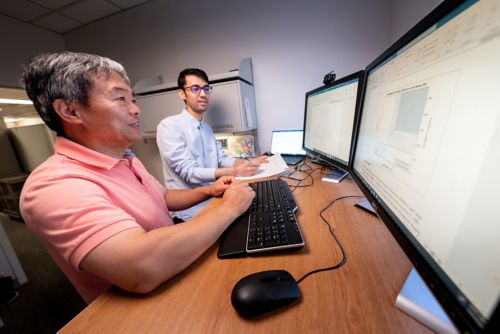St. Jude Family of Websites
Explore our cutting edge research, world-class patient care, career opportunities and more.
St. Jude Children's Research Hospital Home

- Fundraising
St. Jude Family of Websites
Explore our cutting edge research, world-class patient care, career opportunities and more.
St. Jude Children's Research Hospital Home

- Fundraising
Yimei Li Group
Specializing in the analysis of neuroimaging, longitudinal and survival data, and the development of novel clinical trial design
About the Li Group
The ability to assess complex data is fundamental to successful clinical research. As investigators and clinicians study the life-long impacts of pediatric catastrophic disease, the analysis of such complex datasets presents both challenges and opportunities. Unraveling this rich data can reveal previously inaccessible information and help establish new insights that impact clinical care. To assist in this effort, our group develops novel biostatistical methods inspired by our robust clinical collaborations.

Our research summary
The key focus of our group is the collaborative research with Departments of Radiation Oncology and Radiology. We are responsible for designing, monitoring, and analyzing the 13 clinical trials from these two departments. We work on many different types of imaging data including diffusion tensor imaging (DTI), positron emission tomography (PET), Ultrasound, and functional magnetic resonance imaging (fMRI) data. Motivated by data collected from SJMB03/TOTALXVI trials, we are developing mediation analysis-based approaches to understand the interaction between brain injury due to cancer treatments and the resulting neurocognitive effects.
Our group also develops novel clinical trial designs. Because randomized studies are often infeasible in pediatric cancer trials, we recently developed a group sequential design for a historical-controlled trial. An alternative approach is the use of historical controls that incorporate patient-level data as comparison cohorts. We extended the historical-control trial design methods introduced by my former colleagues at St. Jude to perform efficient interim analyses and monitor treatment effectiveness. This method has been implemented in multiple Children’s Oncology Group (COG), Pediatric Brain Tumor Consortium (PBTC), and St. Jude trials. As we move forward, we have interest in contributing to the method development for trials with delayed-treatment effects.

Another area of focus in our methodology development comes from our work with the SJLIFE and Childhood Cancer Survivor Study (CCSS) studies. The complex data collected from these two studies are very rich and often statistically challenging. We have identified some complex missing data problems and published four methodological papers to propose possible solutions. In our current effort, we work to decipher risk factors, including genetic factors, associated with temporal progression of dental disease in cancer survivors.
The novel biostatistical approaches we develop are reflective of our group’s collaborative, explorative nature. Clinical needs observed in our collaborative efforts spark the research and development of new statistical methodologies and, in turn, drive research that benefits clinical care. We pride ourselves on our approach and how our research and development contribute to the advancement of clinical care for children with catastrophic diseases.
HCTDesign
Randomized clinical trials (RCTs) are considered the gold standard for clinical trials comparing treatment groups. However, historical control trials (HCTs) are an alternative to RCTs if randomization is not feasible because of ethical concerns, patient preference, limited patient populations, or regulatory acceptability. The primary benefit of HCTs is that all patients can receive the new treatment with historical data providing the information for the control arm. Therefore, HCTs are useful for studies with limited patient populations. Group sequential designs using Lan-DeMets error spending functions are proposed for historical control trials with time-to-event endpoints. Both O’Brien–Fleming and Gamma family types of sequential decision boundaries are derived based on sequential log-rank tests (Wu and Li, 2017). The HCTDesign package is available in R (https://cran.r-project.org/web/packages/HCTDesign/index.html) and the R package is based on https://www.ncbi.nlm.nih.gov/pmc/articles/PMC7737423/. Shiny App for the HCTDesign package can be accessed at https://sjbiostat.shinyapps.io/HCTs/.
Publications
Contact us
Yimei Li, PhD
Associate Member
Department of Biostatistics
MS 768, Room R6038
St. Jude Children's Research Hospital

Memphis, TN, 38105-3678 USA GET DIRECTIONS